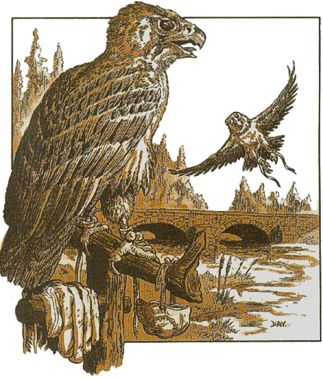

Dragon #269

| Climate/Terrain: | Any elven inhabited |
|---|---|
| Frequency: | Rare |
| Organization: | Family |
| Activity Cycle: | Day |
| Diet: | Carnivore |
| Intelligence: | Semi- (4) |
| Treasure: | Nil |
| Alignment: | Neutral |
| No. Appearing: | Varies |
| Armor Class: | 5 |
| Movement: | 1, fly 39 (B) |
| Hit Dice: | 1-1 |
| THAC0: | 19 |
| No. of Attacks: | 3 |
| Damage/Attack: | 1-2/1-2/1 |
| Special Attacks: | Dive |
| Special Defenses: | Nil |
| Magic Resistance: | Nil |
| Size: | S (up to 4’ wingspan) |
| Morale: | Steady (11) |
| XP Value: | 120 |
The elven hawk appears similar to the common hawk, although it is slighter and has a smaller wingspan. The elven name, crayghe, is a nonsense word designed to imitate the hawk’s cry. Elven breeders mixed various bloodlines over the centuries, producing a faster, more intelligent hawk. Because of their intelligence, elven hawks can be trained to perform many tasks that are beyond their mundane cousins. They can even be taught to understand simple sentences or recognize individuals by name. It would not be unheard of for an elven hawk to carry a written message to a specific person or to scout out enemies. There is a legend of a wounded elven ranger who was fed and guarded by his hawk until help arrived.
Like elven horses, these birds are usually found only in the company of elves. Although they are more widespread through the various elven races, they are less likely to stay with a non-elf, even if raised from a chick. Unless its owner is elven, there is only a 50% chance that an elven hawk wil] bond with its new owner, 65% if the owner speaks some sort of elven language. If no bond is formed, the hawk flies away at the earliest opportunity. Unlike the elven horse, an elven hawk can be purchased, though with a warning to non-elves of their tendency to flee. Most falconers are willing to take the risk, considering the potential benefits if the bird successfully bonds.
Combat: Like most hawks, the elven hawk begins combat by using a diving attack. It receives a +2 attack bonus on the dive and inflicts double damage with its talons. It cannot use its beak during the diving round. After the first round, the elven hawk claws and pecks, targeting its opponent’s eyes. It has a 35% chance of striking an eye, blinding its prey for 1d1O rounds, with a 15% chance of the opponent losing the eye. When attacking with the its beak, the elven hawk automatically damages an eye on a natural 20.
The elven hawk’s eyesight and hearing are superb. It is surprised only on a roll of 1 on 1d20 and always warns its owner if it hears or spots someone or something approaching. The elven hawk is claustrophobic and does not enter a building or enclosed space willingly, If forced indoors, it shrieks, even if hooded, until taken back outside. This noise could attract unwelcome attention or wandering monsters.
Habitat/Society: Elven hawks do not usually stray from their elven masters, so one rarely finds a feral hawk. They can survive anywhere there are rodents, fish, or small reptiles.
The elven hawk mates for life and never chooses to be separated from its mate for any long period. If the bird is kept from its mate for more than a month, it becomes listless and unresponsive. In extreme cases, it might become aggressive, attempting to flee back to its mate. Many elves have surrendered their hawks to other falconers to keep a mated pair together, with the understanding that the first clutch of fledglings will be given as compensation.
Female elven hawks are capable of producing only two or three clutches of eggs (2-5 eggs / clutch) during their entire lifetime. The birds begin to fly within 2 months and become full adults within a year. Elven hawk fledglings sell for about 2,000 gp, whereas a fully trained adult can cost up to 5,000 gp.
Ecology: Elven hawks are a domesticated species bred by the elves for thousands of years. Elven rangers have often warned that if this species should run wild, it would drive slower and less intelligent hawk species to extinction. This is the reason that the elven hawk was bred to have such a strong bond with its owner and to produce young so rarely. By keeping elven hawks numbers low and in inhabited areas, the wild hawk species are protected.
